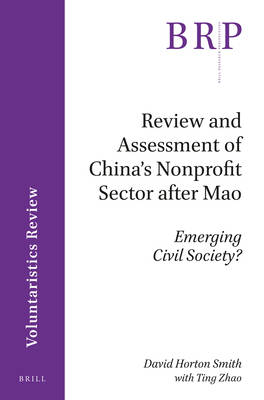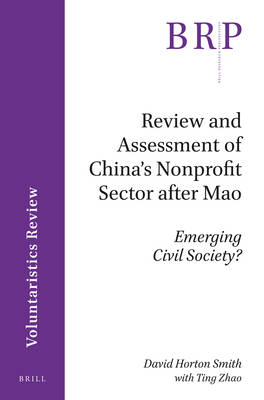
- Afhalen na 1 uur in een winkel met voorraad
- Gratis thuislevering in België vanaf € 30
- Ruim aanbod met 7 miljoen producten
- Afhalen na 1 uur in een winkel met voorraad
- Gratis thuislevering in België vanaf € 30
- Ruim aanbod met 7 miljoen producten
Zoeken
Review and Assessment of China's Nonprofit Sector After Mao
Emerging Civil Society?
David Horton Smith
€ 128,45
+ 256 punten
Omschrijving
Published research in English is reviewed on the Nonprofit Sector (NPS) in mainland China since Mao's death in 1976. A large, diverse, and rapidly growing NPS exists, but openly political Nonprofit Organizations (NPOs) outside the Communist Party and its control are prohibited. China has civil society in the narrower sense: a substantial civil society sector or NPS exists. However, the party-state in China continues to play a dominating role in regard to the NPS, especially for registered NPOs. Freedom of association is still limited in China, especially for national associations, which are nearly all Government Organized Nongovernmental Organizations (GONGOs), not genuine NGOs/NPOs. The broader scope definition of civil society focuses on functioning civil liberties, and the ability of NPOs in general to influence significantly the government on various policy issues. In these terms, China has a weak but slowly emerging civil society with far more associational freedom than under Mao.
Specificaties
Betrokkenen
- Auteur(s):
- Uitgeverij:
Inhoud
- Aantal bladzijden:
- 80
- Taal:
- Engels
- Reeks:
- Reeksnummer:
- nr. 5
Eigenschappen
- Productcode (EAN):
- 9789004326613
- Verschijningsdatum:
- 4/08/2016
- Uitvoering:
- Paperback
- Formaat:
- Trade paperback (VS)
- Afmetingen:
- 150 mm x 231 mm
- Gewicht:
- 136 g

Alleen bij Standaard Boekhandel
+ 256 punten op je klantenkaart van Standaard Boekhandel
Beoordelingen
We publiceren alleen reviews die voldoen aan de voorwaarden voor reviews. Bekijk onze voorwaarden voor reviews.








